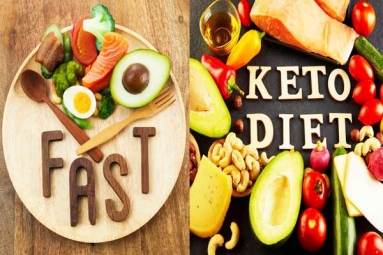
(Image source from: Canva.com)
Intermittent fasting, or IF, has become popular as an effective way to manage weight and improve metabolic health. This eating method involves clearly marked periods of fasting and eating. People can choose to do the 16:8 method, which involves fasting for 16 hours and eating during an 8-hour period, or the 14:10 method, which might be easier to maintain during the rainy season. Studies have shown that IF can help with insulin sensitivity by decreasing insulin spikes, especially when combined with seasonal foods that have a low glycemic index. It also boosts fat metabolism, as the body is better at using fat stores when fasting, which helps with weight loss. Additionally, fasting can help lower oxidative stress.
As the humidity increases during the rainy season, it's important to adjust fasting methods to fit the weather. Fasting may raise the risk of dehydration, especially if fluid loss from sweating isn't taken into account. Choosing an eating time when it is cooler helps ensure you stay hydrated and get enough nutrients. Your appetite might change in this season, making lighter meals during a shorter eating period more attractive and manageable. Thus, let's explore how to practice intermittent fasting in a safe and effective way. The best time to eat during the rainy season is from 9:30 AM to 7:30 PM. Start your day with a light breakfast rich in protein to end the fasting period. Lunch should be the biggest meal, including complex carbs, protein, cooling veggies, and probiotics. The dinner should be lighter, focusing on foods that are hydrating and high in fiber to help digestion.
Electrolytes for hydration: Keeping a good balance of electrolytes is very important when fasting in humid conditions. To avoid dehydration and support the functioning of muscles and nerves, add fresh coconut water, lemon water with salt, salted buttermilk, and water-rich foods like cucumber and seasonal fruits to your diet. Relying only on plain water for hydration is not enough.
Proteins for muscle and metabolism: Eating enough protein is crucial for maintaining muscle mass while losing weight. Include foods like curd, paneer, eggs, pulses (especially sprouted), and chicken in your meals to make sure you have enough protein during the eating period.
Probiotics for digestion: Healthy digestion is important for overall well-being and managing weight. Probiotics help maintain a healthy gut and reduce bloating, which can be an issue during the rainy season. Simple sources of probiotics include fermented foods like curd, idli, dosa, kanji, and homemade pickles.
Complex Carbohydrates For Sustained Energy: Whole grains and beans offer energy that lasts longer, which helps avoid tiredness and low energy levels while fasting. Millets are a great choice because they are free of gluten and full of vitamins and minerals.
Healthy Fats For Balance: Having the right balance of fats is important for good health. Use a mix of healthy oils such as sunflower, peanut, and virgin olive oil, along with mustard oil, to get the correct variety of fats.
Antioxidants For Immunity: The rainy season can often lead to seasonal illnesses and tired-looking skin. Antioxidants help reduce inflammation. Add colorful fruits and vegetables like red, blue, purple, green, and white to your meals. This provides a constant supply of antioxidants and helps keep your skin healthy.
Hydration During Fasting: Drinking enough fluids is especially crucial during fasting times. Aim to drink at least 35 ml of water for every kilogram of your body weight each day. Water infused with spices, herbal teas, and green tea can help with fluid intake and also support metabolism.
Sleep and Stress Management: The humidity and changing temperatures during the rainy season can increase fatigue. Getting enough sleep and managing stress are very important. Practices like meditation, having a relaxing evening routine, and eating light dinners can enhance overall well-being.
Intermittent fasting in the rainy season can be refreshing, effective, and beneficial for health if done thoughtfully. By tuning into your body, eating nutrient-rich seasonal foods, and staying well-hydrated, IF can transform from just a diet into a way of life that aligns with the natural rhythm.















